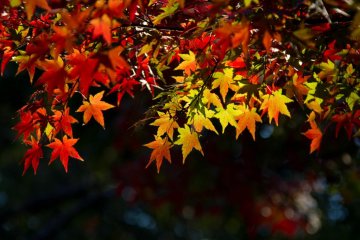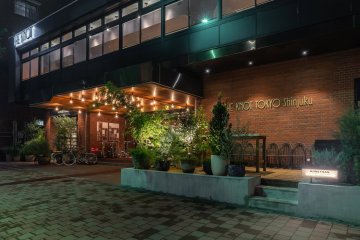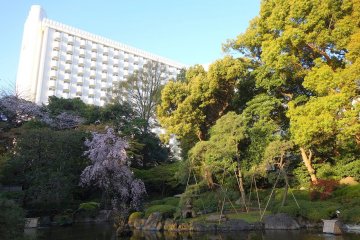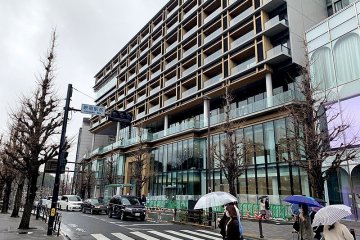
Couleurs d'Automne au Parc Yoyogi
Nicole BauerLes cerisiers, érables et ginkgos du parc Yoyogi à Tokyo offre une multitude de couleurs automnales magnifiques !

En tant que l'un des plus grands espaces verts publics de Tokyo, le parc Yoyogi attire les Tokyoïtes à la recherche de soleil, de tranquillité et de la possibilité de profiter de l'un des divers festivals que le parc accueille tout au long de l'année.
Bien que le parc Yoyogi ait relativement peu de cerisiers par rapport aux autres parcs de Tokyo, c'est un magnifique point de vue pour la saison des fleurs de cerisier au printemps. Il est également connu pour ses arbres ginkos, dont les feuilles deviennent dorées à l'automne.
Avant que le parc ne devienne un parc municipal en 1967, la zone était le site du village olympique des Jeux de 1964. Le parc Yoyogi est juste à côté du sanctuaire Meiji.
Tokyo Metro Chiyoda line: Yoyogi Koen (Exit 3 or 4) or Meiji-jingumae/Harajuku Station (Exit 2) JR Yamanote line: Meiji-jingumae/Harajuku station (Omotesando Exit)

Les cerisiers, érables et ginkgos du parc Yoyogi à Tokyo offre une multitude de couleurs automnales magnifiques !

Situé à deux pas de l'immense parc central de Shinjuku, THE KNOT TOKYO Shinjuku est un hôtel moderne de caractère avec un accès facile à la gare de Shinjuku et au sanctuaire Meiji. Le bâtiment de l'hôtel de 14 étages a été rénové et rouvert sous le nom de THE KNOT TOKYO Shinjuku en août 2018. La conception de l'atrium spacieux offre une atmosphère détendue et relie le restaurant, le bar, le salon et le hall les uns aux autres. L'hôtel dispose de plus de 400 chambres et 7 types de chambres et au dernier étagent se trouvent des chambres de style occidental offrant une vue sur le parc ainsi qu'une suite avec terrasse récemment ouverte. L'un des points forts de THE KNOT est sa délicieuse cuisine. Vous y trouverez six zonesde restauration, proposant par exemple des grillades au thé noir de qualité ou du pain frais.

With Koenji being a "creative town" it's no surprise that the BnA Hotel opened there in 2016 and has had, subsequently, an incredible impact on the local community. BnA (Bed and Art) has other spaces dotted about Tokyo and Kyoto, but the Koenji edition is possibly more immersive as the concept is "stay in an artwork." In collaboration with local artists, the BnA has created an impressive multi-storey art experiment for art lovers and creatives with a desire to inhabit art. The first floor acts as a front desk and bar which comes alive at night with events and selected DJs. It also hosts Masu Masu onigiri cafe with artists being asked to come and exchange artwork with each other in a gesture which reflects the true spirit of Koenji. With two "living art" twin rooms taking up the second and third floors designed by a seasonal rotation of local artists, guests can engage with and inhabit their art rooms. BnA Koenji also plays host to a rooftop lounge and a basement space which is used for artists residencies where their work is shown to the public and a DJ booth and streaming equipment for live performances. With live painting events and an eclectic variety of regular events, the BnA Hotel becomes, itself, a living canvas. The BnA believes that it's a machigata hotel, meaning that guests should (and are encouraged) to interact with Koenji. Use the public sentos, eat in the local restaurants that surround the hotel and buy locally from the multitude of shops, market stalls, bars and cafes which make-up the fabric of Koenji. Feted by international press such as The Guardian, BnA acts as a creative network with the concept of serendipity being discussed as the bar becomes an ad hoc meeting place where collaborations and friendships between artists and locals are born. The BnA was also instrumental in a street art festival named MCP (Mural City Project) which was supported by Suginami Ward. MCP was incredibly ambitious and truly communal with the desire to transform and coalesce the community through the creation of public murals. The BnA, Koenji and Suginami spearheaded a public art movement which should be commended and replicated throughout Tokyo.

Just minutes from Shinagawa Station, the Grand Prince Hotel New Takanawa is surrounded by lush greenery in the Takanawa area, with rooms offering balcony views of the nearby gardens and the surrounding Tokyo cityscape. This urban resort features convention facilities like the Hiten banquet hall, the international Convention Center Pamir, as well as a wide variety of Japanese, Chinese and Western restaurants.

Mame Shiba Cafe offers a unique experience where you can interact with Shiba dogs while enjoying your favorite drinks. You cannot make reservations in advance through phone or online, so it is best to book early in the morning at a store. The cafe requires customers to make a reservation in-store, present their receipt at the reserved time, and then enter the cafe.

B-Flat Commune is an open-air hangout in Omotesandō featuring a variety of stalls and food trucks offering unique drinks, clothing, and bites to eat. Its relaxed vibe and plenty of seating make it an ideal spot for casual meetups and spending time with friends. It's a creative place where people can gather to eat a the open-air dining space or purchase fashion, antiques, product goods and other lifestyle items. Events are sometimes hosted at this community space, and operating stores may change from month to month.

If you're a fan of Quentin Tarantino’s Kill Bill, there's one Tokyo restaurant that absolutely deserves a spot on your bucket list. While you may not know it by its real name, chances are you've seen it on screen—it’s the unforgettable setting for the iconic, over-the-top showdown between The Bride and the Crazy 88. Known affectionately by fans as “The Kill Bill Restaurant,” this venue offers more than just cinematic nostalgia—it's a vibrant and unique dining experience in its own right. Located in Tokyo’s upscale Nishi-Azabu district, this classic-style izakaya bar is where fiction meets flavor. Though the fake blood and samurai swords have long been cleaned away, the spirit of the film lives on in the architecture and atmosphere. Stepping inside feels like walking onto the set: a grand, high-ceilinged hall with a central open-plan dining space, surrounded by a mezzanine-level balcony—instantly recognizable to anyone who’s watched the movie. But don’t mistake it for just a movie-themed attraction. The Kill Bill restaurant is a serious culinary destination. It offers a wide variety of traditional Japanese dishes, from sashimi and grilled skewers to noodle dishes and seasonal specialties. The menu also boasts creative fusion items like avocado and camembert tempura, which nods to the restaurant’s global popularity and mindset. And for international travelers with specific dietary needs, the restaurant provides vegan and halal-friendly menus (with at least three days’ notice). What makes this spot truly special is its ability to deliver a top-tier gourmet experience while doubling as a pop culture pilgrimage. You can sip sake where Uma Thurman once sliced through waves of enemies—minus the chaos, of course. Whether you’re a die-hard Tarantino fan, a foodie on the hunt for authentic Japanese flavors, or simply someone looking for a unique night out in Tokyo, this restaurant checks every box. Just one tip: Enjoy the drinks and dishes, but leave the swordplay to the professionals. Note: As you’d expect, Gonpachi is a popular restaurant. Same-day reservations are possible, but ideally you’ll want to reserve your table at least two days ahead of your visit, and even earlier if you’re planning to visit at the weekend.

Meiji Jingu is located in technologically advanced Tokyo and only a few minutes from the quirky streets of Harajuku. This famous Shinto shrine is hidden among a thickly forested area, creating an atmosphere of tranquility in the heart of Japan's bustling metropolis. Meiji Jingu is one of the most popular shrines in Tokyo and is visited by millions of people every year. The shrine’s daily ceremonies, incredible architecture, and scenic grounds make it a memorable and rejuvenating destination for tourists and Shinto practitioners alike. History The relatively recent shrine was built in 1920 to commemorate Japan’s first modern emperor and empress, Emperor Meiji and Empress Shoken. In 1867, Emperor Meiji ascended to the throne, effectively marking the end of Japan’s feudal era and the beginning of the Meiji Period. During his rule, Emperor Meiji guided Japan into a more modern and westernized way of life and revamped international relations by building connections with other countries. The shrine was tragically destroyed by 1945 bombings, but was quickly rebuilt in 1958 thanks to public donations. Today Meiji Jingu and its surrounding forest stand as a beacon of the Shinto faith, creating an atmosphere of harmony between first-time guests, practitioners, nature, and the past. Given its location in Tokyo, the easily accessible shrine is a common destination for visitors. Meiji Jingu is open every day from sunrise to sunset and has no admission fee. The shrine has one southern entrance and two northern, all of which are marked by towering torii gates. When visitors pass under the gates, which mark the separation between the sacred and secular world, it is customary to bow. The path to the shrine’s main complex is lined by a lush forest composed of over 100,000 trees and a variety of plant species, many of which were donated to the area from all over Japan. The densely wooded area effectively blocks out the sights and sounds of Tokyo, enveloping visitors in an environment of zen where they can clear their minds as they walk to the main shrine entrance. Once visitors step across the threshold onto the main grounds, they can leave their everyday worries behind and immerse themselves in the shrine’s architectural beauty and Shinto practices.

Avec un accès facile depuis la gare de Harajuku, "With Harajuku" est le lieu de résidence et l'espace de shopping n°1 de cette Mecque de la mode qu'est le quartier d'Harajuku. À With Harajuku, les résidents peuvent devenir une partie active de la mode en constante évolution de Tokyo. Les visiteurs peuvent profiter de la grande offre de boutiques et de restaurants, y compris un nouvel Ikea. Harajuku est une zone située autour de la gare de Harajuku, considérée comme le centre de la culture des adolescents et des styles de mode les plus extrêmes du Japon. Non loin de là se trouve le quartier glamour d'Omotesando, où les marques de luxe internationales s'affrontent. Le Takeshita Dori n'est pas loin de With Harajuku, où vous pourrez découvrir des boutiques tendances ainsi que des friperies et vous immerger dans la culture de la mode du Japon.

The Tōgō Shrine was established in 1940 and dedicated to Gensui The Marquis Tōgō Heihachirō shortly after his death. This shrine was destroyed by the Bombing of Tokyo, but was rebuilt in 1964. It is located in Harajuku, Tokyo, Japan. There, The Marquis Tōgō Heihachirō is celebrated as a shinto kami. [Wikipedia]